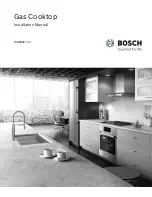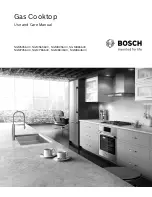
10
Adjust Leveling Legs
1.
If range height adjustment is necessary, use a wrench or
pliers to loosen the 4 leveling legs.
This may be done with the range on its back or with the range
supported on 2 legs after the range has been placed back to
a standing position.
NOTE:
To place range back up into a standing position, put a
sheet of cardboard or hardboard in front of range. Using 2 or
more people, stand range back up onto the cardboard or
hardboard.
2.
Measure the distance from the top of the counter to the floor.
3.
Measure the distance from the top of the cooktop to the
bottom of the leveling legs. This distance should be the
same. If it is not, adjust the leveling legs to the correct height.
The leveling legs can be loosened to add up to a maximum of
1" (2.5 cm). A minimum of
³⁄₁₆
" (5 mm) is needed to engage
the anti-tip bracket.
NOTE:
If height adjustment is made when range is standing,
tilt the range back to adjust the front legs, then tilt forward to
adjust the rear legs.
4.
When the range is at the correct height, check that there is
adequate clearance under the range for the anti-tip bracket.
Before sliding range into its final location, check that the anti-
tip bracket will slide under the range and onto the rear
leveling leg prior to anti-tip bracket installation.
NOTE:
If a Trim Kit will be used, the top of the cooktop
should be higher than the counter. See the Installation
Instructions included with the Trim Kit for the correct height.
Level Range
1.
Place level on the oven bottom as indicated in one of the two
figures below depending on the size of the level. Check with
the level side to side and front to back.
2.
If range is not level, use a wrench or pliers to adjust leveling
legs up or down until the range is level.
NOTE:
Range must be level for satisfactory baking
performance and best cleaning results using AquaLift
®
Self-Clean Technology.
Make Gas Connection
This range is factory-set for use with Natural gas. To use this
range with LP gas, see the “Gas Conversions” section before
connecting this range to the gas supply. Gas conversions from
Natural gas to LP gas or from LP gas to Natural gas must be
done by a qualified installer.
Typical flexible connection
1.
Apply pipe-joint compound made for use with LP gas to the
smaller thread ends of the flexible connector adapters (see B
and G in the following illustration).
2.
Attach one adapter to the gas pressure regulator and the
other adapter to the gas shutoff valve. Tighten both adapters,
being certain not to move or turn the gas pressure regulator.
WARNING
Tip Over Hazard
A child or adult can tip the range and be killed.
Install anti-tip bracket to floor or wall per installation
instructions.
Slide range back so rear range foot is engaged in the
slot of the anti-tip bracket.
Re-engage anti-tip bracket if range is moved.
Do not operate range without anti-tip bracket installed
and engaged.
Failure to follow these instructions can result in death
or serious burns to children and adults.
WARNING
Explosion Hazard
Use a new CSA International approved gas supply line.
Install a shut-off valve.
Securely tighten all gas connections.
If connected to LP, have a qualified person make sure
gas pressure does not exceed 14" (36 cm) water
column.
Examples of a qualified person include:
licensed heating personnel,
authorized gas company personnel, and
authorized service personnel.
Failure to do so can result in death, explosion, or fire.











































